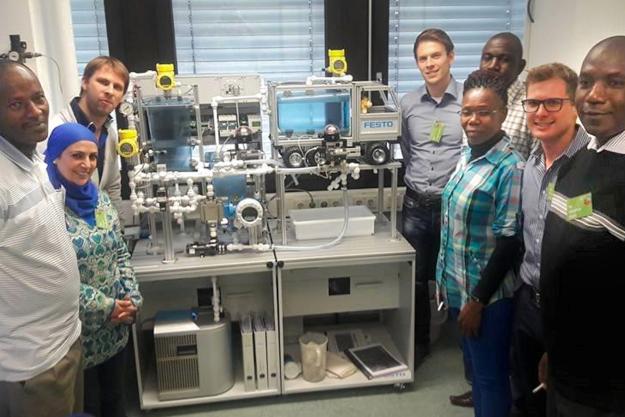
Attendees of courses in loss prevention and safety promotion in chemical industry at University of Wuppertal (UW)
THE HAGUE, Netherlands — 19 April 2017 — Loss prevention and safety promotion in chemical industry were the focus of two annual courses held by the University of Wuppertal (UW), Germany, and the Organisation for the Prohibition of Chemical Weapons (OPCW) at the UW’s Department of Safety Engineering, from 3-7 April 2017.
Through these courses, 23 participants and industry professionals from Africa, Asia, Latin America and the Caribbean gained knowledge and skills needed to implement modern technical-safety practices and develop sustainable safety management within the chemical industry.
Each course was area-specific, tailoring to specific situations in targeted regions in terms of chemical safety culture and management, relevant legislation, operational and environmental risks, fire, explosive and toxic hazards, hazard assessment and CBRNE protection.
Attendees discussed process-control engineering, manipulation of protection devices and safety management; covered disaster management and emergency response, as well as risks associated with human factors; and carried out practical exercises in a laboratory and at a mini-plant specially built for training purposes.
Particular emphasis was placed upon participants contributing to a culture of safety within their working environments.
In addition to their training, participants visited the regional Emergency Response Centre, the Fire Brigade of Axalta Coating Systems Germany GmbH, and the chemical plant at INEOS Köln GmbH.
This course is funded by the Federal Foreign Office, Government of Germany, and organized by the OPCW with the support of the University of Wuppertal.
Since the inception of the OPCW Chemical Safety Programme in 2009, a total of 12 capacity-building courses have run with the assistance of these partners, benefiting 140 experts from 53 countries in Africa, Asia, Latin America and the Caribbean.
Background
As the implementing body for the Chemical Weapons Convention, the OPCW oversees the global endeavour to permanently eliminate chemical weapons. Since the Convention’s entry into force in 1997 – with its 192 States Parties – it is the most successful disarmament treaty eliminating an entire class of weapons of mass destruction.
To date, nearly 95 per cent of all chemical weapon stockpiles declared by possessor States have been destroyed under OPCW verification. For its extensive efforts in eliminating chemical weapons, the OPCW received the 2013 Nobel Prize for Peace.
